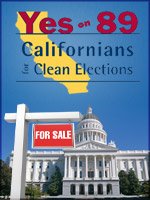
The $2.8 Trillion Dollar Corporate Interests Fighting to Stop Proposition 89 and Reform
Three dozen big corporations with nearly $3 trillion in assets are among the economic elite leading a campaign to stop Proposition 89, the reform measure that would stem political corruption and reduce the influence of special interests in California politics, according to data released today by Prop. 89 proponents.
In addition to their $2.8 billion in total assets, the 36 companies, all donors against Prop. 89, reported $73 billion in total profits last year, and their top 155 executives received $959 million in total compensation, an average of $6.1 million each.
The list is headed by such corporate heavyweights as oil companies - Chevron, Conoco/Phillips, and Occidental; HMOs - United Healthcare Services, Blue Cross, and Aetna; insurance companies - Fireman’s Fund, Farmers, Travelers, and Mercury; and utilities – Southern California Edison and PG&E (see attached chart for a full list).
Notably the breakdown does not even include some of state and nation’s biggest corporations – including pharmaceutical and banking industry giants – whose contributions against Prop. 89 are masked through political action committees.
The size of the economic elite’s opposition stands in stark contrast “to the regular Californians who are harmed every day by the imbalance in our political system” said Deborah Burger, RN, president of the California Nurses Association which sponsored Prop. 89, www.yeson89.org.
“We see patients who can not afford medications they’ve been prescribed, or who can only take their medication every other day. We see patients and their families waiting hours in emergency rooms for care they should have received in a clinic, but have been shut out of the system for lack of medical coverage. We see children with debilitating chronic asthma that is directly linked to breathing polluted air,” Burger said.
“We need to take out the coercive influence of money in politics so our legislature can set policies based on their constituents, not on their biggest donors,” added CNA Executive Director Rose Ann DeMoro.
“In California we are increasingly at the point where we don’t have elections, we have auctions. That’s what Prop. 89 would change,” she said.
Proposition 89 reduces how much corporations, unions or individuals can give to candidates, bars contributions to candidates by lobbyists and government contractors, and limits corporations to spending no more than $10,000 on ballot initiatives. It supports candidates who reject private fundraising with a set limit of public funds. If politicians or lobbyists break the law, they can be fined, removed from office, or jailed.
Prop. 89 is supported by the League of Women Voters of California, American Association of Retired Persons (AARP) California, Sierra Club California, Los Angeles Mayor Antonio Villaraigosa, Sen. Barbara Boxer, San Francisco Mayor Gavin Newsom, California Common Cause, Foundation for Taxpayer and Consumer Rights, United Teachers Los Angeles, and the California Clean Money Campaign, among more than 300 community organizations and leaders.


No comments:
Post a Comment